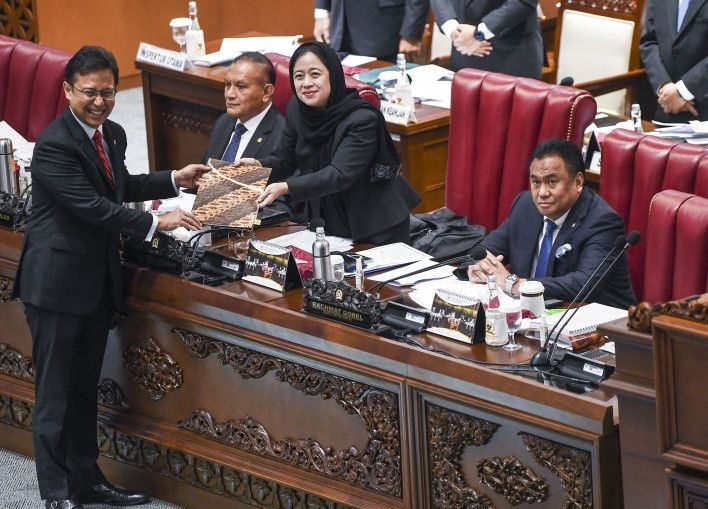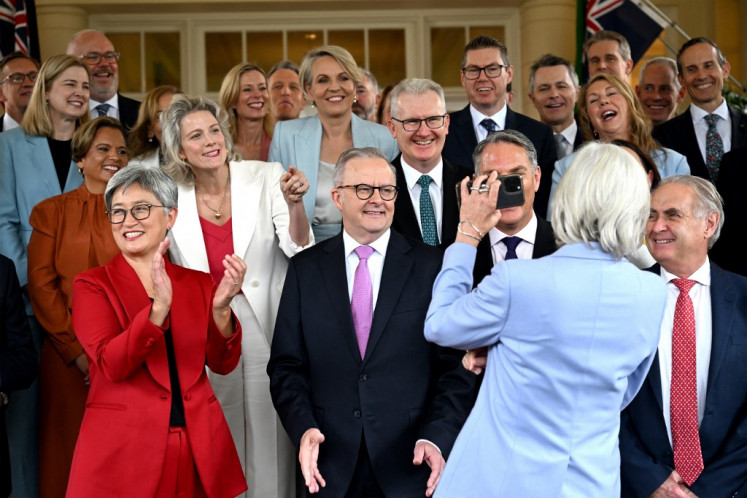No mandatory health spending as new law passed
Critics say change will impede health reform.
Change text size
Gift Premium Articles
to Anyone

L
awmakers passed the omnibus health bill into law on Tuesday, eliminating mandatory health spending, which critics say will hurt the development of the national health system.
All seven pro-government parties at the House supported the bill. Two opposition parties, the Democratic Party and the Prosperous Justice Party (PKS), voted against the bill, citing rushed deliberation and the removal of mandatory spending for the health sector as their reasons.
The new health law supplants 11 existing laws governing public health, including the 2009 law on health.
The previous law mandated that the government allocate at least 5 percent of the state budget to public health every year. Provincial administrations had to spend at least 10 percent of their budgets on health. This public health spending did not include salaries and benefits for government employees working in the health sector.
The government has argued that mandatory spending on health has led to ineffective budget expenditure at the regional level. Local health authorities often spend all their allocated budgets even if the spending is unnecessary.
Under the new law, the budgeting will be based on the national health program, formulated by the government and the House of Representatives. “This will follow the national health planning, which will become clear guidelines for the government and regional administrations,” said Health Minister Budi Gunadi Sadikin during the House plenary meeting on Tuesday.
This approach to budgeting will serve as an incentive or disincentive for different regions based on their progress in implementing the government’s national health development plan, said Emanuel Melkiades Laka Lena, the deputy chairman of House Commission IX overseeing health and welfare.
Rarely a priority
Critics argued the elimination of mandatory health spending from the law would threaten any development progress in the health sector. Two opposing political parties, the Democratic Party and the Prosperous Justice Party (PKS), voted against the the bill, citing the removal of mandatory health spending.
The mandatory spending is still important to ensure the sustainability of health funding due to the complexity of health problems in the future, said PKS politician Netty Prasetyarini. The removal of the required spending on the health sector also illustrates “the lack of commitment from the government to provide proper and equal health services across the country,” said Democratic Party politician Dede Yusuf M. Effendy.
The required health spending is also important for dozens of cities that have not fulfilled the 10 percent budget allocation. At least 58 of 514 cities and regencies spent less than 10 percent of their budget on public health in 2021, according to the Center for Indonesia’s Strategic Development Initiatives (CISDI).
The government had previously claimed that an average of 8 percent of the state budget was spent on the health sector.
Furthermore, the available budget was not distributed equally. “The health sector rarely becomes a priority in regional development planning,” said CISDI founder and CEO Diah Saminarsih in a statement. “The removal of mandatory spending eliminates the guarantee of health system reform at the national and regional level.”
She also criticized the deliberation process that was rushed with little to no public consultation. Lawmakers passed the bill as the House’s initiative in February and started deliberating it in April. “The consultation process was very short and done behind closed doors. It’s very hard for civil organizations to give meaningful input for the bill,” Diah said.
Threatening vulnerable groups
Aside from the mandatory health spending, civil society groups also accused the new law of not considering vulnerable groups. The law did not have clear regulation on tobacco products advertisement, which might threaten children’s health, according to CISDI. Around 65 percent of Indonesia’s children are exposed to tobacco advertisements through various media, according to the 2019 Global Youth Tobacco Survey.
The ad exposure is believed to be linked to an increase in underage smoking. The same 2019 survey also found that around 75 percent of the 70.2 million Indonesians who smoke are believed to have started smoking before the age of 20.
The new policy will negatively impact vulnerable communities that were protected under the previous health law, such as the elderly, disabled people, women and people in remote areas, as access to health services will be limited, according to the Civil Society Coalition for Health Access Justice.
Led by the Indonesian Medical Association (IDI), doctors, nurses, dentists and other medical workers had threatened to strike if the bill was passed into law. They opposed the bill from the beginning of the deliberations, demanding that it be brought back to the drawing board.
Just hours before the Tuesday House plenary session, hundreds of doctors and nurses staged a last-ditch demonstration in front of the House complex to pressure lawmakers into delaying the enactment of the law.
At the core of their dispute was the role of medical associations. At least one version of the bill contained provisions that allowed multiple associations to represent the same medical specialty, potentially undermining the central role of the IDI, which is currently the only medical association in the country.









